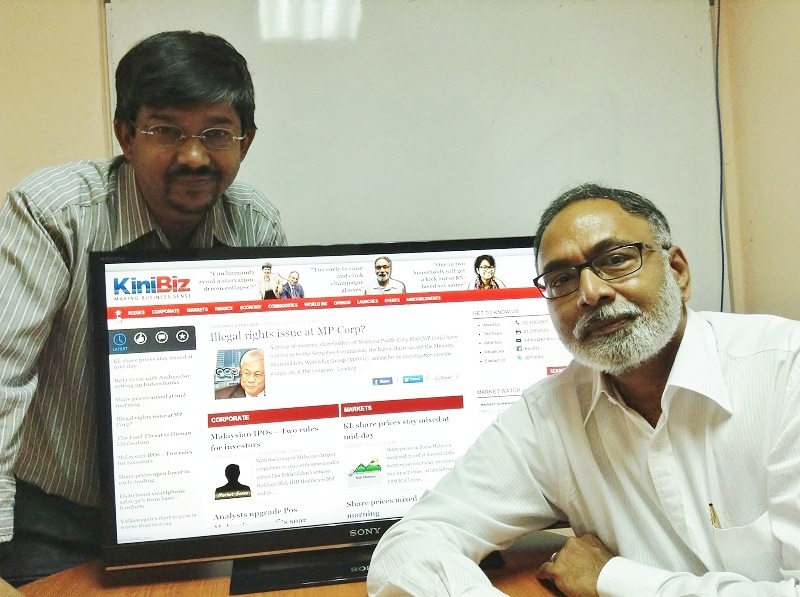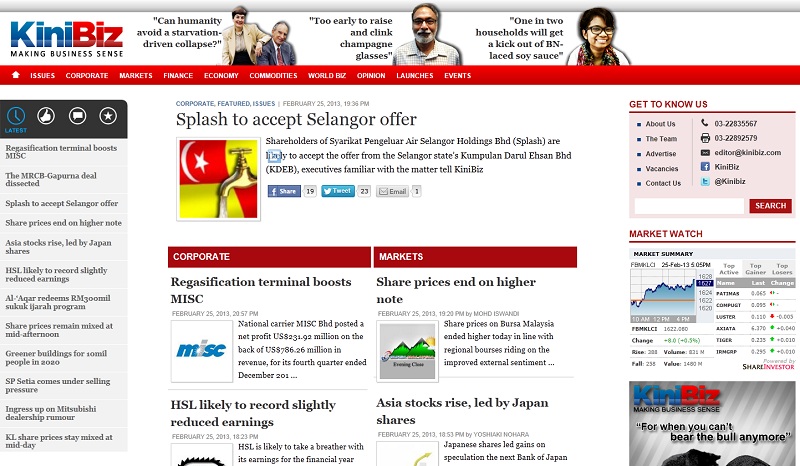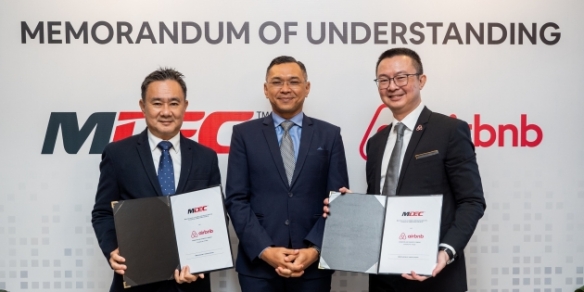KiniBiz to bring Mkini’s indie journalism to business community
By A. Asohan February 26, 2013
- Records 12,500 unique visitors and 76,000 pageviews within first 12 hours
- ‘Business community has become more anxious about real situation in the country’

ADVERSITY is just another term for opportunity as the adage goes, so this uncertain and anxious economic and political climate seemed the perfect time to launch an independent portal dedicated to business news.
At least, that was the thinking behind Malaysiakini launching KiniBiz on Feb 19, with its tagline “Making Business Sense” – perhaps also a play on words and Malaysiakini’s plans to diversify. On that first day of going live, it says it recorded 12,500 unique visitors within 12 hours, and 76,000 pageviews.
Malaysiakini itself launched in November, 1999, amidst trying political times in the country, with a mission to deliver independent and fair reporting in a media landscape dominated by companies owned directly or indirectly by parties of the ruling Barisan Nasional coalition.
It has since gone on to win awards and accolades from from the International Press Institute, Reporters Sans Frontiers, Committee to Protect Journalists and others. Citing Alexa rankings, Malaysiakini says that as of July 2008, it became the most read news website in Malaysia.
With KiniBiz, it hopes to bring the same quality of journalism and critical analysis, or as publisher and founding editor P. Gunasegaram (pic, right) puts it, create “a synthesis of thought” around business and economic issues.
He felt strongly enough about it that he plonked down the funding to make it a joint, 50-50 venture between himself and Malaysiakini, whose chief executive officer Premesh Chandran will also be acting as CEO of the company KiniBiz Sdn Bhd.
“People have been asking us for a business news portal for years now, and some had even offered to run the ship for us, but it was always about the level of confidence we had,” says Premesh (left in pic above, pic courtesy of Malaysiakini), speaking to Digital News Asia a few days after launch.
That level of confidence changed with Gunasegaram – or ‘Guna’ – coming into the picture. The 30-year veteran has worked as a journalist for big names such as Business Times, Malaysian Business, The Edge and The Star, and also as an analyst and head of equity research at local and foreign brokerage firms.
“It’s not only his role but the kind of people he can pull in for his team,” Premesh says of his partner in the venture. “People will look at who’s running the ship, and this is where Guna’s reputation and credentials help.
“So that really gave us the confidence that this is the right time,” he adds.
A second factor fueling Malaysiakini’s belief that this was the right time was that Gunasegaram was willing to invest in the venture, Premesh adds.
“Anybody can say they’re interested and then leave in a few months,” he says. “Business journalists generally get paid more, and there’s always opportunity elsewhere since competitors can always offer a better paycheck.
“You can’t compete with all that and keep a person of Guna’s stature, so the fact that he was willing to invest was also a commitment from him for the long haul.”
Thirdly, Malaysiakini itself has got over a lot of the issues it faced in the early years, and has launched sites dedicated to Chinese and Malay content, introduced Malaysiakini.tv, and has built up its technical expertise over time.
It was also the first news site in Malaysia to put up a paywall and charge subscription, a model which will be replicated at KiniBiz.
“Lastly, I think the business community in Malaysia in the last two to three years has become more open, and more anxious as well about the real situation in the country,” says Premesh.
“All these things came together, and there was no good reason not to do it.”
Business model
 KiniBiz will be offered for free for at least the next month, perhaps two months, before its subscription model kicks in.
KiniBiz will be offered for free for at least the next month, perhaps two months, before its subscription model kicks in.
This will depend “on how much of a response we get and us getting everything to run properly,” says Gunasegaram. “People may need a little time to come to the website, and we don’t want to put up a barrier too early.”
Malaysiakini charges RM150 (US$40) per year for users to access daily content, and RM450 (US$120) per year for access to archived content. KiniBiz fees are being finalized, with Premesh saying it would be in the range of RM315 per year, with a joint subscription to both portals at about RM1 a day.
For current Malaysiakini subscribers, if they opt for the joint package, their new one-year subscription will be added to their current one, he adds.
He also acknowledges that KiniBiz’s subscription model will be difficult to pull off, despite Malaysiakini’s pedigree in the space. “It won’t be a walk in the park.”
But both he and Gunasegaram are confident that the business community would be more willing to pay for content.
“The business community has already had experience paying for content, whether it is for the Wall Street Journal or Bloomberg,” says Gunasegaram. “Secondly, content like this involves their bread-and-butter, so you could say it is an investment for them to find out what’s really going on in the market.”
Their target audience are the PMEBs (Professionals, Managers, Executives and Business owners), especially from an advertising point of view, notes Premesh.
“If you segment the market, it would be banking and financial services; those who play the market (traders and stock market people); corporate leaders who want to know about what’s happening in the M&A (mergers and acquisitions) space and what their competitors are doing; even politicians who may want to know who to deal with and who not to deal with; and finally, journalists and individuals with an interest in the market,” he adds.
“Having said that, it is still a much smaller market than that for general news,” notes Gunasegaram. “I think that hard-core business market is anywhere from 10-20% of the general news market.”
While it is a niche market, they believe it also one of higher incomes. KiniBiz’s revenue would be supplemented by online advertising, with cross-selling and packages available for both the business and the general news portals.
The rates for KiniBiz will be higher on a per-person basis than those for Malaysiakini, given that the latter has much higher traffic. There will also be some unique propositions for the business portal, says Premesh.
“The idea is to have fewer ad positions and less clutter, but more visibility and a more compelling proposition for advertisers,” he says. “You will get more visibility for your advertising dollar.”
While the two decline to disclose how much has been poured into KiniBiz, they say they expect to break even by their second year of operations, although they are aiming to reach the break-even point by the end of the first year.
When that happens, they will launch the next phase: The regional play.
“With the Asean community coming into play in 2015, the whole regionalization of business news will be very interesting,” says Premesh.
The Asean Economic Community (AEC) is being touted as the next step of economic integration to transform the Association of South-East Asian Nations bloc into a single market and production base.
When that happens, KiniBiz will look into establishing a presence in Singapore, Jakarta, Bangkok and Manila, in that order – primarily with editorial and sales teams, with operations still being based out of Kuala Lumpur.
What it has no immediate plans for is developing an app, although KiniBiz did pay attention to ensuring the site was pretty much optimized for mobile browsing.
“We need to do other things before we will look there – an app may not be hard to build, but will be costly to maintain,” says Premesh. “I think that the added value an app may bring us is not justified yet.”
“We’d rather focus on the 20% that can bring in the 80% first,” Gunasegaram concurs. “The challenge is to get the subscription levels up.”
Tomorrow: Gunasegaram – from print journalism to Internet entrepreneur, and his thoughts on the difference between the two
For more technology news and the latest updates, follow @dnewsasia on Twitter or Like us on Facebook.


